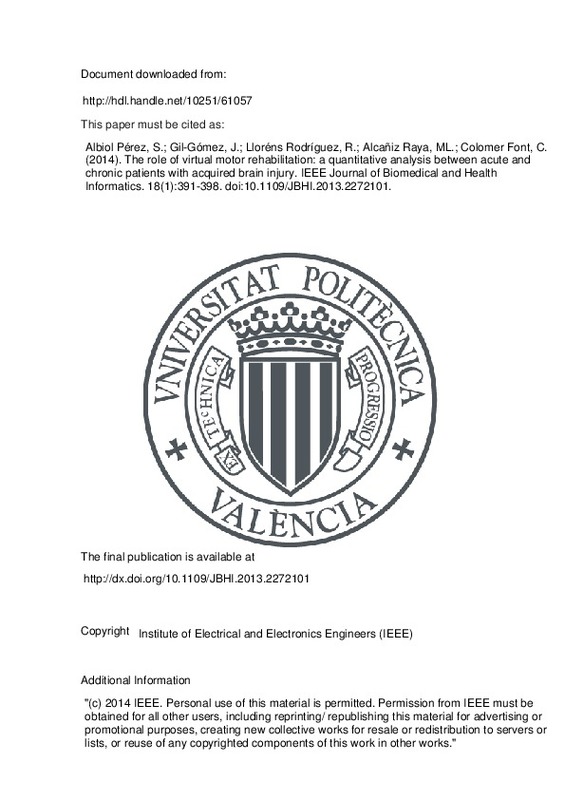JavaScript is disabled for your browser. Some features of this site may not work without it.
Buscar en RiuNet
Listar
Mi cuenta
Estadísticas
Ayuda RiuNet
Admin. UPV
The role of virtual motor rehabilitation: a quantitative analysis between acute and chronic patients with acquired brain injury
Mostrar el registro sencillo del ítem
Ficheros en el ítem
| dc.contributor.author | Albiol Pérez, Sergio
|
es_ES |
| dc.contributor.author | Gil-Gómez, José-Antonio
|
es_ES |
| dc.contributor.author | Llorens Rodríguez, Roberto
|
es_ES |
| dc.contributor.author | Alcañiz Raya, Mariano Luis
|
es_ES |
| dc.contributor.author | Colomer Font, Carolina
|
es_ES |
| dc.date.accessioned | 2016-02-22T12:21:13Z | |
| dc.date.available | 2016-02-22T12:21:13Z | |
| dc.date.issued | 2014-01 | |
| dc.identifier.issn | 2168-2194 | |
| dc.identifier.uri | http://hdl.handle.net/10251/61057 | |
| dc.description | "(c) 2014 IEEE. Personal use of this material is permitted. Permission from IEEE must be obtained for all other users, including reprinting/ republishing this material for advertising or promotional purposes, creating new collective works for resale or redistribution to servers or lists, or reuse of any copyrighted components of this work in other works." | es_ES |
| dc.description.abstract | Acquired brain injury (ABI) is one of the main problems of disability and death in the world. Its incidence and survival rate are increasing annually. Thus, the number of chronic ABI patients is gradually growing. Traditionally, rehabilitation programs are applied to postacute and acute patients, but recent publications determine that chronic patients may benefit from rehabilitation. Also, in the last few years, the potential of virtual rehabilitation (VR) systems has been demonstrated. However, until now, no previous studies have been carried out to compare the evolution of chronic patients with acute patients in a VR program. To perform this study, we developed a VR system for ABI patients. The system, vestibular virtual rehabilitation (V2R), was designed with clinical specialists. V2R has been tested with 21 people ranging in age from 18 to 80 years old that were classified in two groups: chronic patients and acute patients. The results demonstrate a similar recovery for chronic and acute patients during the intervention period. Also, the results showed that chronic patients stop their improvement when they finish their training. This conclusion encourages us to direct our developments toward VR systems that can be easily integrated at home, allowing chronic patients to have a permanent VR training program. | es_ES |
| dc.description.sponsorship | This work was supported by the Ministerio de Educacion y Ciencia Spain: Projects Consolider-C (SEJ2006-14301/PSIC), "CIBER of Physiopathology of Obesity and Nutrition, an initiative of ISCIII," and the Excellence Research Program PROMETEO (Generalitat Valenciana. Conselleria de Educacion, 2008-157). | en_EN |
| dc.language | Inglés | es_ES |
| dc.publisher | Institute of Electrical and Electronics Engineers (IEEE) | es_ES |
| dc.relation.ispartof | IEEE Journal of Biomedical and Health Informatics | es_ES |
| dc.rights | Reserva de todos los derechos | es_ES |
| dc.subject | Acute/chronic acquired brain injury | es_ES |
| dc.subject | balance rehabilitation | es_ES |
| dc.subject | virtual motor rehabilitation | es_ES |
| dc.subject | virtual reality | es_ES |
| dc.subject.classification | LENGUAJES Y SISTEMAS INFORMATICOS | es_ES |
| dc.subject.classification | EXPRESION GRAFICA EN LA INGENIERIA | es_ES |
| dc.title | The role of virtual motor rehabilitation: a quantitative analysis between acute and chronic patients with acquired brain injury | es_ES |
| dc.type | Artículo | es_ES |
| dc.identifier.doi | 10.1109/JBHI.2013.2272101 | |
| dc.relation.projectID | info:eu-repo/grantAgreement/MEC//SEJ2006-14301/ES/NUEVAS TECNOLOGIAS DE LA INFORMACION Y LA COMUNICACION: INTEGRACION Y CONSOLIDACION DE SU USO EN CIENCIAS SOCIALES PARA MEJORAR LA SALUD, LA CALIDAD DE VIDA Y EL BIENESTAR./ | es_ES |
| dc.relation.projectID | info:eu-repo/grantAgreement/GVA//PROMETEO08%2F2008%2F157/ES/Promoción del bienestar a través de las tecnologías de la información y comunicación (probientic)/ | es_ES |
| dc.rights.accessRights | Abierto | es_ES |
| dc.contributor.affiliation | Universitat Politècnica de València. Departamento de Sistemas Informáticos y Computación - Departament de Sistemes Informàtics i Computació | es_ES |
| dc.contributor.affiliation | Universitat Politècnica de València. Instituto Interuniversitario de Investigación en Bioingeniería y Tecnología Orientada al Ser Humano - Institut Interuniversitari d'Investigació en Bioenginyeria i Tecnologia Orientada a l'Ésser Humà | es_ES |
| dc.contributor.affiliation | Universitat Politècnica de València. Departamento de Ingeniería Gráfica - Departament d'Enginyeria Gràfica | es_ES |
| dc.description.bibliographicCitation | Albiol Pérez, S.; Gil-Gómez, J.; Llorens Rodríguez, R.; Alcañiz Raya, ML.; Colomer Font, C. (2014). The role of virtual motor rehabilitation: a quantitative analysis between acute and chronic patients with acquired brain injury. IEEE Journal of Biomedical and Health Informatics. 18(1):391-398. https://doi.org/10.1109/JBHI.2013.2272101 | es_ES |
| dc.description.accrualMethod | S | es_ES |
| dc.relation.publisherversion | http://dx.doi.org/10.1109/JBHI.2013.2272101 | es_ES |
| dc.description.upvformatpinicio | 391 | es_ES |
| dc.description.upvformatpfin | 398 | es_ES |
| dc.type.version | info:eu-repo/semantics/publishedVersion | es_ES |
| dc.description.volume | 18 | es_ES |
| dc.description.issue | 1 | es_ES |
| dc.relation.senia | 276801 | es_ES |
| dc.contributor.funder | Ministerio de Educación y Ciencia | es_ES |
| dc.contributor.funder | Generalitat Valenciana | es_ES |







![[Cerrado]](/themes/UPV/images/candado.png)

